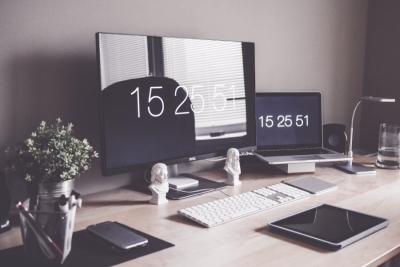We can probably all agree that we spend a LOT of our time at work. Our own work space can often feel like an area where we’re not in control. Given the impact that our physical environment can have on our mental health, it’s easy to see how a disorderly workspace can lead to increased stress or exacerbate other underlying mental health issues.
Whether it’s an untidy desk space, poor lighting, noisy colleagues, or even topics of conversation within the office that make you feel uncomfortable, unwelcome elements in a workplace can sometimes be difficult to overcome, no matter how minor they may seem. It all adds up – and can make or break the enjoyment of being in the working environment.
However, that doesn’t mean that everything is out of your control. Here, we’ve come up with a few tips to help you regain control of your working environment and ensure that those little niggles don’t become the final straw of an already stressful day.
Weather & lights
The British weather can be varied, and it’s recognised that it can really impact our mood. This is can be especially true on a damp Monday morning when getting into the office after a relaxed weekend feels particularly challenging.
So how can we make sure that our working environment always feels nice and sunny? SAD lamps could be one way of doing this – sat on your desk or near your work station they’re designed to replicate natural light, and can help treat those with Seasonal Affective Disorder. Whilst there’s mixed opinion of the effectiveness of these to treat SAD, brightening up your work space with more natural-feeling light will certainly help on those dreary mornings and possibly help to lift your mood.
Desk space
It may seem trivial, but ensuring your desk space is clean, tidy, and a comfortable place to be can make a huge difference to feeling happy at work; especially if you’re in a role that means you’re at your desk a lot.
Making sure that paperwork is tidied away, rubbish is binned or recycled, and clutter is minimised can work wonders when it comes to keeping a clear head.
Making your workspace your own with photos, plants, or the occasional ornament can help too. Whilst there will be limitations depending on where you’re working (so no building of desk forts), adding a small plant or two can make a huge difference to how you feel at your desk. Workplaces are often sterile and unnatural feeling places, so bringing nature indoors can work wonders for making your desk feel like a more homely place.
Hotdesking and clear-desk policies can make this difficult – but that doesn’t mean that you can’t pop a couple of desk items in your laptop bag that you can whip onto whatever desk you happen to be working on.
Noise
Offices can be noisy places, especially when you’re trying to get your head down to really focus on something. Headphones are the obvious answer to this – but not everybody can work with music on. Plus, if you can still hear the muffled conversation in the background it’s probably way more irritating anyway.
Suggesting your workplace has a quiet area might be an option. It’s unlikely you’ll be the only person needing a bit of peace to be able to crack on with some work, so it’s not like you need to lock yourself into a dark meeting room to get away from it all.
Working from home
If the office environment is proving too much and your employer allows it, then working from home occasionally might be an option. Most companies now have the technical infrastructure to be able to offer this, so it’s worth asking if you’re able to do so if you feel it’ll be productive, particularly if you need a day without distractions. Working from home means you’re in an environment you’re comfortable with, so can pay dividends in terms of productivity, as well as help keep your mental health in check.
That’s provided of course you don’t get distracted, and don’t do it too often. We’re social creatures after all, so being at home alone all of the time can be detrimental. Not only that, but the majority of job roles require interaction with larger teams of people – something you’ll miss out on if you make a habit of working from home, especially if you’re a part of a team that is otherwise all office-based.
That's all for part 1 - read part 2 here.


